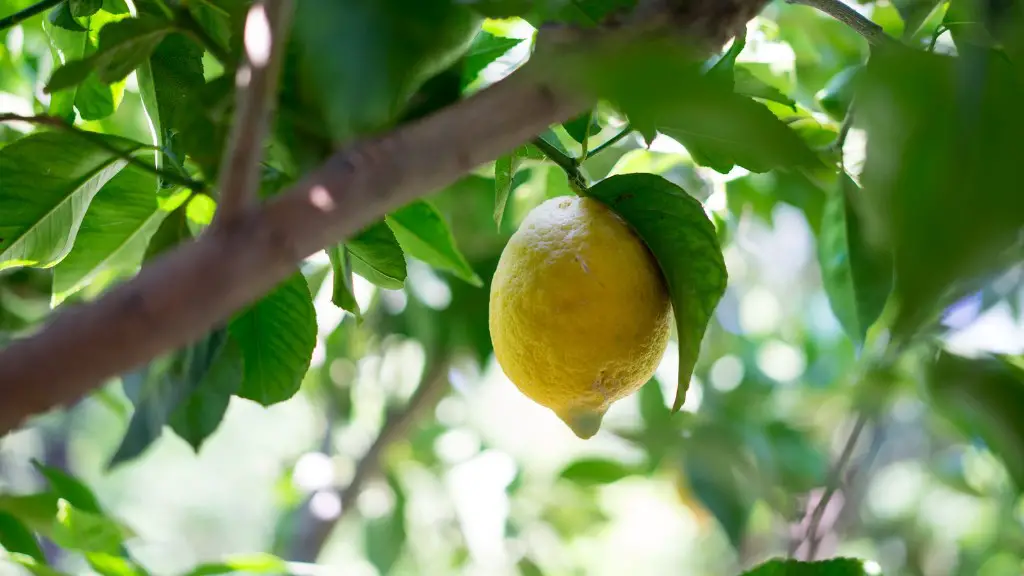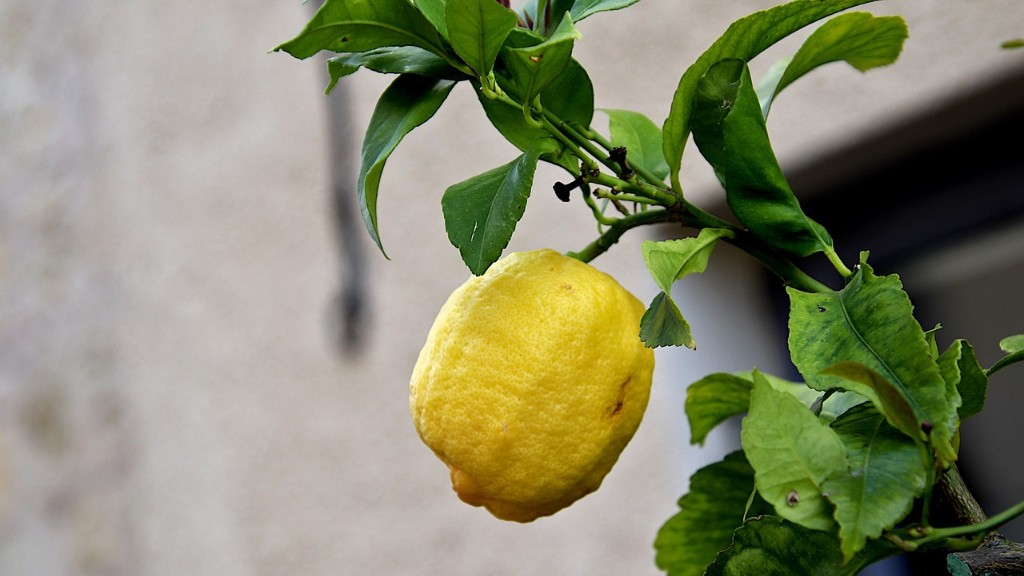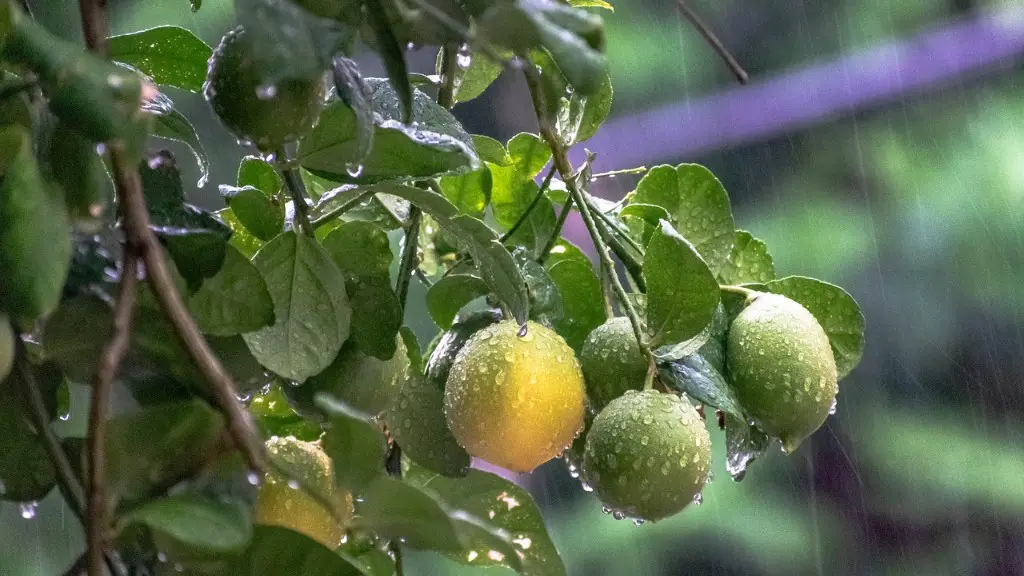It is quite possible to grow a lemon tree from a seed. While the process is rarely successful, with the right conditions, it is not impossible to grow the perfect lemon tree. The process requires patience and skill, as some steps will need to be taken to ensure the fruits of your efforts are successful.
First, the seed needs to be obtained. This can be done by simply pressing the fruit of a lemon, or by purchasing the seeds online. Once the seed is obtained, it is essential to soak it in temperatures around 80°F in order to properly germinate. You’ll need to keep the seed moist by watering it every two days, or until the seedling starts to emerge out of the soil.
Then, after the seed has begun to sprout, you’ll need to place it in a pot with the proper soil and drainage system. Adding a mixture of sand and loam soil is best as this will add nutrients to the soil to promote better growth for the seedling. To ensure the roots of the tree spread evenly, the container should be around 6 inches in diameter.
The location of the tree is also important. It should be placed in a sunny location and away from any strong winds. If possible, the tree should be grown in pots that can be moved outside during the warmer months and brought in during the winter months. Also, keep in mind that the lemon tree will require plenty of water, though not too much that it drowns the seedling.
It is essential to properly fertilize the tree as well in order to promote growth and yield. This can be done by using organic lemon tree fertilizer. Lastly, pruning the tree is important as it will help shape and encourage branching without causing damage to the tree.
What is the Right Climate for Growing a Lemon Tree from Seeds?
The optimal climate for growing a lemon tree depends on the type of tree you are attempting to grow. Citrus trees, for instance, prefer warm climates and generally won’t thrive well in cooler temperatures below 55°F. The best climate for growing lemon trees is a climate that stays consistently warm and has plenty of sunshine.
When selecting a spot to plant your lemon tree, it is also important to take into account things like local rain patterns, water sources, and soil moisture levels. In addition, you should consider any potential pests or diseases that can potentially harm the tree. Lastly, it is essential to take into account the wind direction and speed, as strong gusts of wind can cause damage to the tree’s branches.
Once you have taken all of these factors into account, you can begin to determine the best location to plant your tree. Ideally, the tree should be planted in an area that is easily accessible, so that you can regularly water and fertilize it. This will help ensure that your tree gets the proper care it needs to fully flourish.
What are the Benefits of Growing a Lemon Tree from Seeds?
Growing a lemon tree from a seed offers a wide range of benefits. For one, it is an effective way to create your own sustainable source of fresh citrus fruits. The lemons will be sweeter and more flavorful, as the tree will be better nourished than store bought lemons.
Besides the obvious benefit of being able to harvest your own lemons, growing a lemon tree from a seed is also a cost-effective way of producing produce. Purchasing store bought lemon trees can be expensive, whereas growing your own lemon tree from seeds is practically free. Furthermore, you can make the most of the fertilizer and soil you buy, as the same supplies can be used to nurture more than just one tree.
Growing a lemon tree from a seed can also be a great activity to enjoy with the family. It is an exciting process to watch and witness as the seed slowly grows and matures into a fully grown tree. Not only is it educational, but it gives children a greater appreciation for nature and the wonders of growth.
Finally, growing a lemon tree from seeds is also beneficial to the environment. Not only does the tree produce fresh fruits that are free from chemical residues and other harmful impurities, but it also helps to contribute to decreasing the amount of carbon dioxide in the atmosphere.
What Type of Soil Should Be Used for a Lemon Tree?
When growing a lemon tree, the type of soil used is essential for optimal tree growth. The ideal soil should have good drainage, which can be achieved by adding coarse sand, perlite, and vermiculite. This will help keep the soil aerated and well-drained.
In addition, it is important to use soil that provides plenty of nutrients to the tree. Adding compost, manure, and fertilizers will help ensure the lemon tree gets the necessary nutrition for healthy growth. You can also add a layer of mulch to help maintain soil moisture and keep the roots cool.
Furthermore, it is important to take into consideration the soil pH levels when selecting the soil for your lemon tree. Ideally, the soil pH should be slightly acidic, ranging from 6 to 6.5, as this is the ideal pH for growing citrus.
In general, it is recommended to use a potting soil specifically meant for citrus trees as this will provide the most beneficial soil for growing a lemon tree. Lastly, be sure to use a container that is big enough for the roots to have plenty of room to spread and grow.
What Types of Fertilizers Should be Used?
The type of fertilizer used when growing a lemon tree is important to ensure that the tree receives the proper nutrients it needs. A good fertilizer will provide essential elements such as nitrogen, phosphorous, and potassium. Organic fertilizers such as compost, manure, or fish emulsion are great for lemon trees as these sources provide a slow and steady release of nutrients that the tree can benefit from.
In addition, slow-release fertilizers are a great option, as these break down gradually over time and provide a consistent supply of nutrients. Moreover, liquid fertilizers are an option as well, though they should be used sparingly and in moderation as they can easily overwhelm the lemon tree.
It is also important to understand that not all fertilizers are created equal and not all fertilizers are appropriate for a lemon tree. For instance, chemical fertilizers, while very aggressive in providing immediate nutrients, should be avoided as they can harm the soil and the tree.
It is essential to properly research the type of fertilizer and nutrients your lemon tree requires in order to ensure its health and overall growth. Lastly, be sure to never over-fertilize the tree, as this can potentially cause more harm than good.
What are the Common Diseases and Pests to Look Out For?
Unfortunately, lemon trees are susceptible to a variety of diseases and pests. It is essential to familiarize yourself with the common problems so that you can act quickly and reduce any damage to the tree.
Common diseases that can affect lemon trees include root rot, canker, gummosis, and scab. It is important to regularly inspect and monitor your tree, as early detection of these diseases can make all the difference.
Common pests that can affect the lemon tree include aphids, citrus whitefly, and cottony cushion scale. Most pests can be eliminated with insecticides or protectants, however, it is important to note that chemical treatments can damage the tree, which is why proper identification of pests is essential.
Finally, it is important to take preventative measures in order to minimize the risk of disease and pests. This includes keeping the tree pot and soil clean, regularly pruning the tree, and regularly supplying proper nutrients to the soil. Furthermore, it is essential to fertilize the soil with organic fertilizers and pest sprays in order to reduce any potential harm to the tree.





